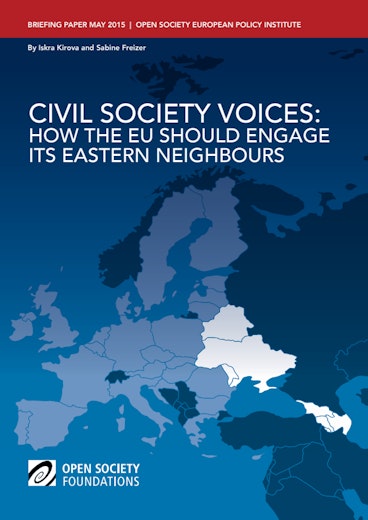The Case for an Ambitious EU Policy in Its Eastern Neighbourhood
By Iskra Kirova
The EU’s “eastern neighbourhood” is an increasingly complicated and contested space. Moscow’s aggression in Ukraine and the pressure it put on Moldova and Armenia not to sign EU association agreements have raised the costs of EU integration for neighbours and the EU alike.
Countries have paid dearly for their choice of a European future with lives and territory, insecurity and punitive trade measures. The EU’s regional Eastern Partnership initiative—a European Commission-led, seemingly bureaucratic program—has brought substantial political influence through the prospect of free trade and alignment with European values and standards. But, despite its stated ambition to be a political player in the neighbourhood, the EU is unwilling to embrace the far-reaching potential of this project.
The EU’s reluctance to restate that the association agreement is not the final goal in relations during the recent EU–Ukraine Summit, and concessions to Russia on the implementation of the bilateral EU–Ukraine Deep and Comprehensive Free Trade Agreement, are both examples of the EU’s readiness to scale back its ambitions to accommodate Moscow. It helps that many of the EU’s eastern partners are ruled by self-serving elites—in or out of power—who resist reform and violate the values on which the Eastern Partnership is based. The EU is now suggesting that a more limited partnership based on “areas of strongest common interests” [PDF] might be a better approach in the neighbourhood than pursuing a broad transformative agenda.
Experts and civil society leaders from the Eastern Partnership countries with whom the Open Society Foundations consulted over the past year believe this would be a mistake. Sovereign and well-governed neighbours are critical to European security. An ambitious Eastern Partnership that protects partners’ right to make independent choices, and promotes justice and the rule of law, remains the EU’s most effective foreign policy instrument to build stable institutions and states and uphold neighbours’ sovereignty.
The EU has had significant influence in its neighbourhood, supporting largely peaceful, homegrown change. The promise of good governance and better living standards reinforced domestic constituencies for reform in Georgia, Moldova, and Ukraine. Its most dramatic effects were manifested in the Euromaidan movement that defended Ukrainians’ right to build an accountable, better governed, and less corrupt state with EU support. In Georgia in 2003 and Moldova in 2009, popular movements brought peaceful transformation of political power and used the EU as a reference point for the progress they wanted to see in their own countries.
Today, the EU association agreements are an anchor for a range of economic and governance reforms. These transitions took decades and were not predictable.
Although the scope for relations with the three other partners—Armenia, Azerbaijan, and Belarus—is more limited now, the EU should continue to engage them and especially to support reform-minded actors. It will otherwise lose opportunities to stimulate change when political conditions improve. The more consistent the EU is in taking a firm and principled approach in relations with these governments, the more it strengthens domestic reformers.
The EU has levers with each and has its own interests to advance. Armenia wants more EU financial aid, while Azerbaijan is interested in deepening trade and energy links. Both want visa-free travel, access to the internal market, and technological transfers. Belarus, the most prominent outlier from the policy, seeks greater mobility to the EU and EU technical assistance. The Eastern Partnership offers all three a vehicle to broaden their foreign policy options and strengthen their independence vis-à-vis Russia. The EU should use its sticks and carrots more adroitly. When its fundamental interests—which include respect for basic human rights—are violated, it should be ready to apply targeted sanctions.
The EU still has many allies in civil society in the region. Some of them have carried the democracy agenda for decades through changes of government, often at great personal risk. The EU should not undermine them and its own interests by being inconsistent about its principles. Where government cooperation is limited, the EU can continue to work more closely with those who defend the partnership’s values, including civil society, small and medium-sized enterprises, media, trade unions, and business associations. They increase the EU’s impact by improving the understanding and visibility of its policies.
With the launch of the Eastern Partnership six years ago, the EU was prepared to offer its neighbours integration into the EU market, mobility of people, and close political ties in exchange for rule of law, and democratic and economic reforms. Today, it questions whether this policy has secured its strategic interests and political influence [PDF]. It can, if the EU musters the political will to give it its full backing.
Until March 2023, Iskra Kirova was a senior policy analyst for the Open Society Europe and Eurasia Program.


